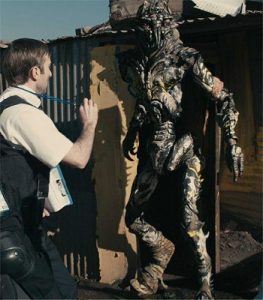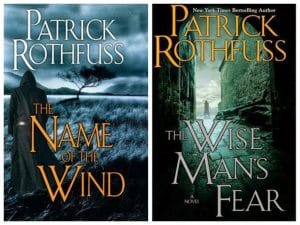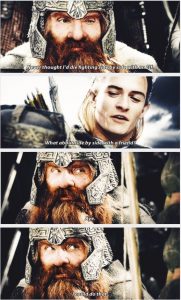Us nerds like nothing more than to banter back and forth on nerdy topics in Slack. Here is one of those chats, very lightly edited.
Adkins (Co-founder of Nerds on Earth, piggyback enthusiast) It wouldn’t be fair to say that for this week’s chat I rounded up the most prolific readers or biggest bibliophiles from among us Nerds, but Joseph and I do the bulk of the book reviews (outside of Clave’s module reviews) and Ross is a genuine (pronounced jin-ewe-ein) author himself.
Once Joseph joined the team, I was anxious to get the three of us together to talk nerdy! So this week’s topic: What makes for a great science fiction or fantasy story?
Why don’t you kick us off, Ross?
Ross (Actually knows what he’s talking about here) I think I mentioned in an earlier chat about low-budget movies that were awesome that my favorite science fiction is the kind that uses the future to talk about the present.
So by that measure, movies with a social commentary aspect like District 9 or the original Day the Earth Stood Still stand up as some of my favorite examples of the genre.
I think they’re successful because by using something unfamiliar, like aliens, they force us to address something familiar – that we see every day.
Does that make sense?
Joseph (Now on his second chat, so the gloves are off) Absolutely!
Adkins What he said.
With you, Ross, we have a unique angle to explore and that is one from the author himself. As you engineered Cafe Noir, what elements of the science fiction genre did you absolutely want to incorporate? Were there any particular pieces to that puzzle that you absolutely adore in other works besides the commentary?
Ross Cafe Noir was meant to be satire first, so those elements of social commentary were always in the forefront of my mind.
But second was the vast, almost unlimited potential for world building.
It’s the future, so everything might be different. People, places, technology, even food, all of those little details come together to make a new little corner of the universe.
So being able to create a new sandbox to play in was an absolute blast. Authors and filmmakers who do that well have my respect.
Adkins I think the world building piece is huge, and it comes in tiers of a sort. You can have anything from “the world is pretty much as it is IRL but with this one tweak” to “nothing is as you know it to be.”
And I love works from each and everywhere in between.
Joseph As do I.
Adkins My personality demands that I know the rules, though. No matter where on the world scale your work falls, I want to know how things work.
Ross Consistent storytelling is key
Joseph What’s your preferred method of finding out the rules, Adkins?
Do you prefer for an author to lay it out as part of the exposition, or to let you discover them as you go along?
Adkins Good question! I think what I like best is when the basics are exposited but the nuances are discovered.
I want the author to give me the elementary and wow me with their advanced play in the sandbox that is their world.
Ross Who do you think does that well?
Joseph I’ve loved that about Rothfuss’ Kingkiller Chronicles so far!
Adkins Exactly. Perfect example. As you read that series, Rothfuss does things in the narrative that make total sense given the rules of his world but can feel unexpected and therefore exciting.
Ross I love William Gibson for that sort of thing.
Adkins You could almost compare my preference to LEGOs. You show me a brick at a time and then combine them into something spectacular.
Ross Ooh, good analogy!
Really puts the “building” in “world building.”
Adkins What about you, Joseph? What helps make for a standout science fiction or fantasy story for you?
Joseph Well, you guys are hitting on all my main thoughts so far. For me, the real strength of sci-fi and fantasy is the opportunity it affords to talk about the real world without talking about the real world.
It’s easier, and therefore more effective sometimes, to talk about racism when it’s Starfleet and the Klingons instead of white Americans and black Americans. For example…
A show like the recent(ish) remake of Battlestar Galactica managed to go pretty deep into topics like racism, religious freedom, and terrorism, all while being an awesome sci-fi show.
Adkins And that’s a neat trick these genres can pull. You can read them, totally miss any commentary or morals, and still get an amazing story.
Joseph Yep.
Ross I feel like that’s harder with fantasy. That might just be the books I’ve read, but I feel like it’s harder to talk about contemporary issues in the context of elves and dwarves.

Joseph I hear you, Ross. But the racism/class difference issue is exactly what Tolkien was doing with Legolas and Gimli. They were from two peoples who basically hated each other, but they spent time together, pulling for the same cause, and ended up being best friends.
Ross Hmm, true.
Joseph They realized that the other one wasn’t just an arrogant elf or headstrong dwarf, but a real, live person with thoughts and feelings.
Ross So there’s world building and commentary. What else is there?
Joseph The final element, for me, that makes a great sci-fi or fantasy story is that they’re fun. Or at least self-aware enough to not be super drab and dreary.
Tolkien, for example, was intentionally writing a British mythology. So even though LOTR was super serious, it wasn’t be-all-end-all serious.
Adkins I think the element of “fun” is why I choose to read these genres more than any other. They’re like escapes, you know? Imagination engines.
Joseph Yeah! Escapes that can tell you important things about the place you escaped from, and maybe (in the best ones, I think) offer a way forward when you get back.
Ross Ooh, yeah.
Adkins Dang. Well said, Joseph.

